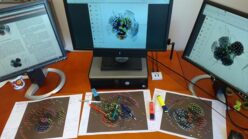I have already written and published several literature reviews. Some were pure review papers, but most were empirical research papers that reviewed extant theory before reporting methods and results.
I have been more lucky to publish systematic literature reviews than with critical literature reviews (have one that has been bouncing back with rejects already 3 times). Besides my experiences, I feel that my students know more about using some online available tools for literature reviews than me.
I have a very carefully curated collection of references organized in .bib files, but my students might write faster literature reviews even if they did not read, digested or organized hundreds of papers as I did before. I learned during my master thesis, that you (1) get an article, (2) read a sentence (3) imagine that you throw the sentence written on paper to the garbage, (4) write in your words sentence and cite the source. However, now as a teacher, I came across students that did not get the articles, barely read them and go to one of the recent AI generative tools that can write and format the literature review for them as in a quite advanced state.
Whether is ethical or not, whether it leads to plagiarism or not, it’s productive. Still, literature reviews generated with those systems will not lead to serious scientific advances per se. But I think in future, many great scientific discoveries will be communicated and integrated with a literature review that leveraged the power of AI generative tools or AI “co-pilots”.
It is a hot topic, last December when attending the International Conference on Information Systems, many panels were discussing the use of generative AI systems in teaching and research. A panel on the use of AI generative systems in papers submitted to top journals led to a lot of discussion and disagreements.
It’s time to learn about this things, and here is a good place to share my lessons learned. I started learning about this on YouTube. I ended up following the videos of academics such as and
They introduced me to a good few tools and processes that should help in the process. It’s time now to test them and see if they can help me with my current research on how students evaluate information in the context of sports and fitness. At the moment, I already know about a few “must cite” papers. Would AI tools find them? Will I get plagiarized content? Would it be worth learning of these tools? Or it is faster to just do it the good old way? So far is seems a very interesting and a creative process to combile all those different tools.
Continue reading Learning about the use of AI generative tools for literature reviews
